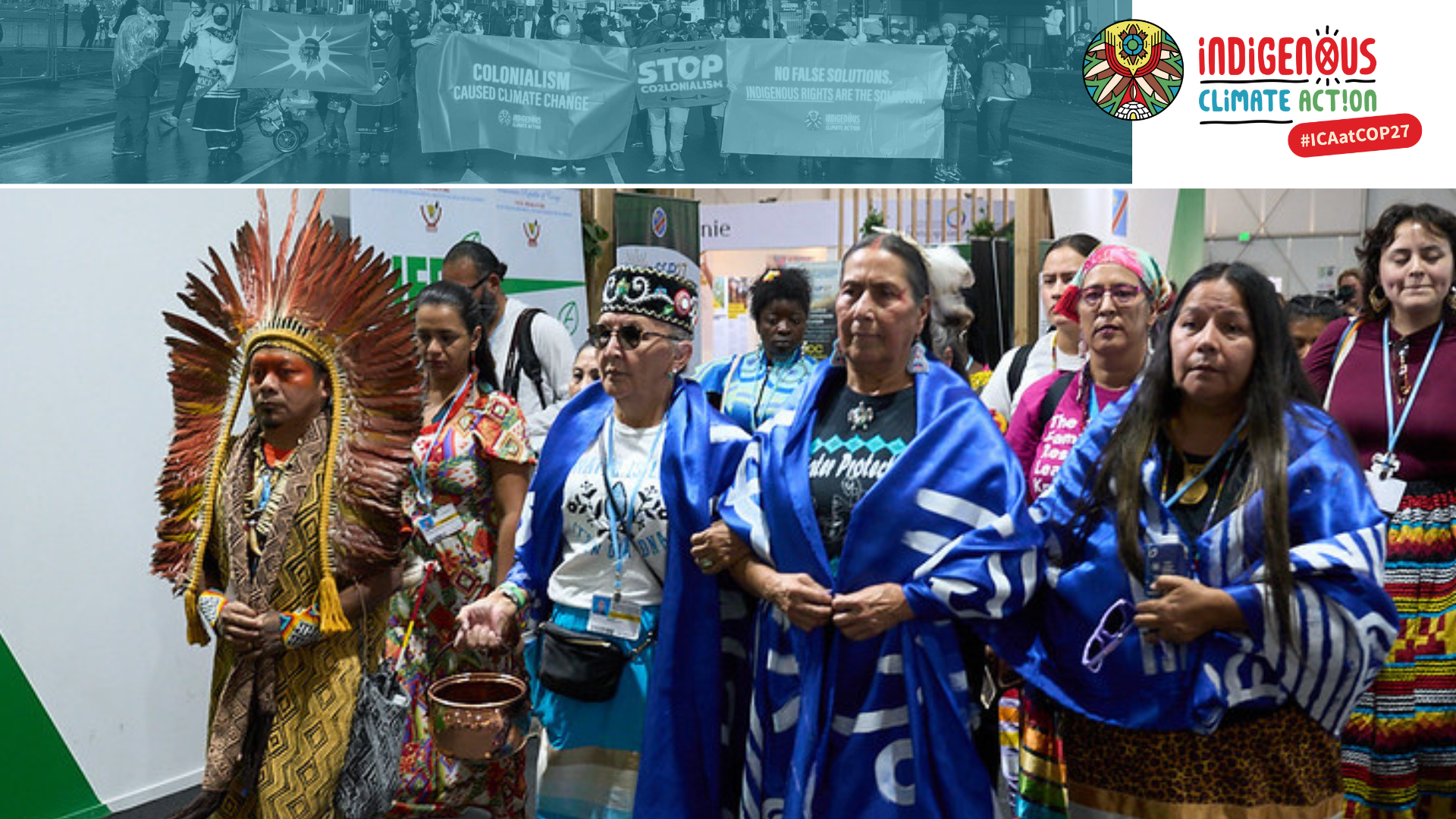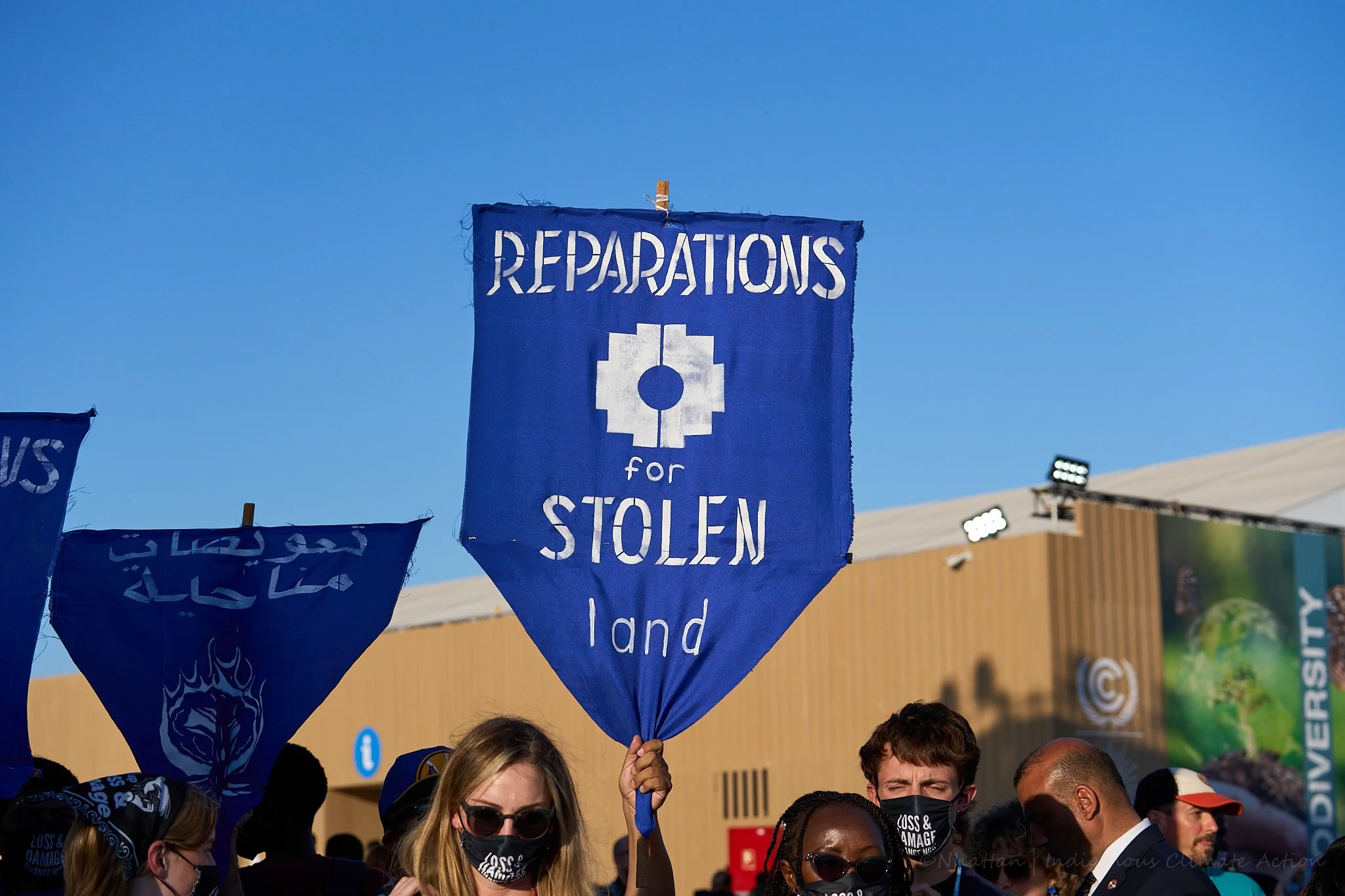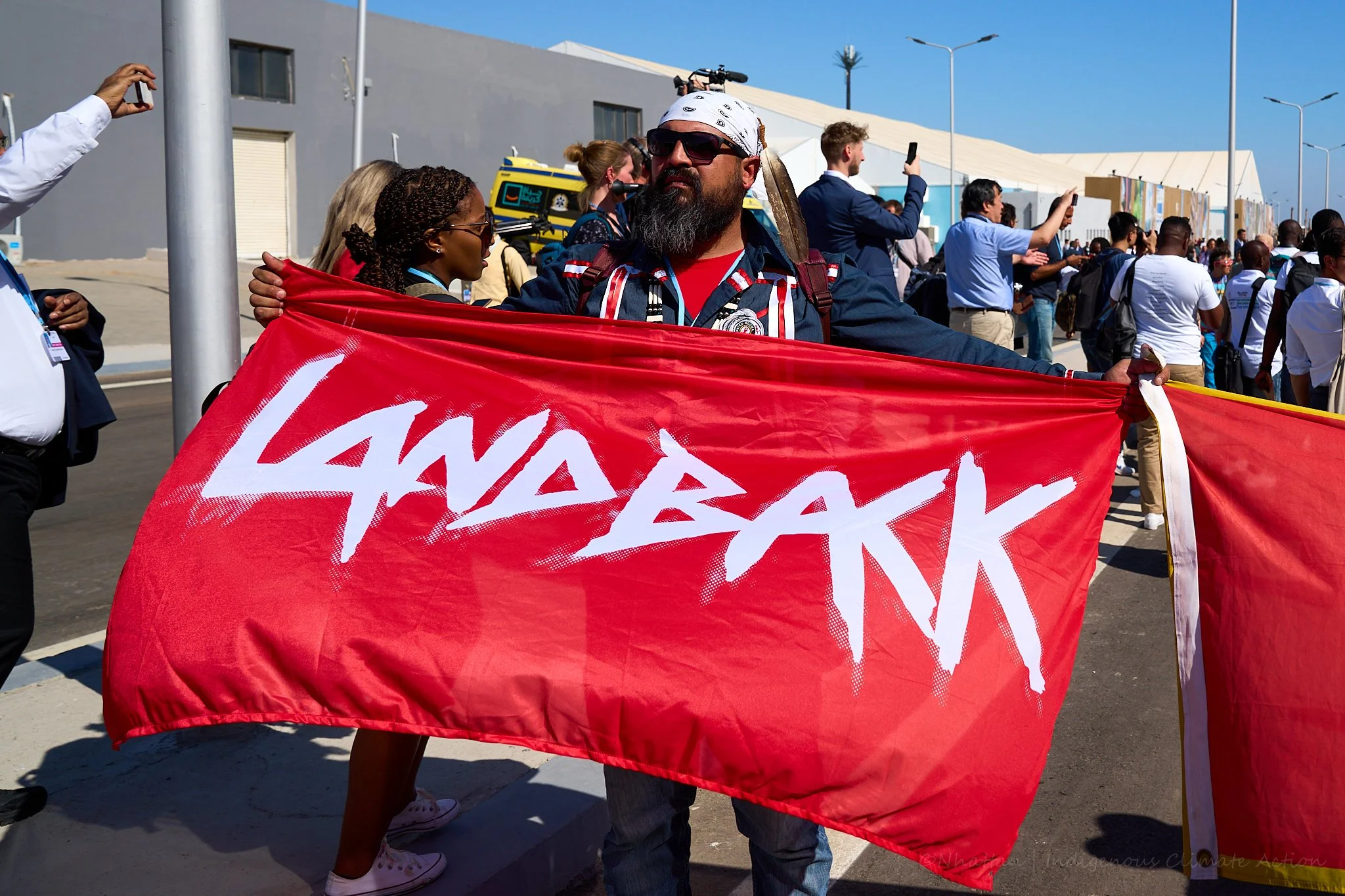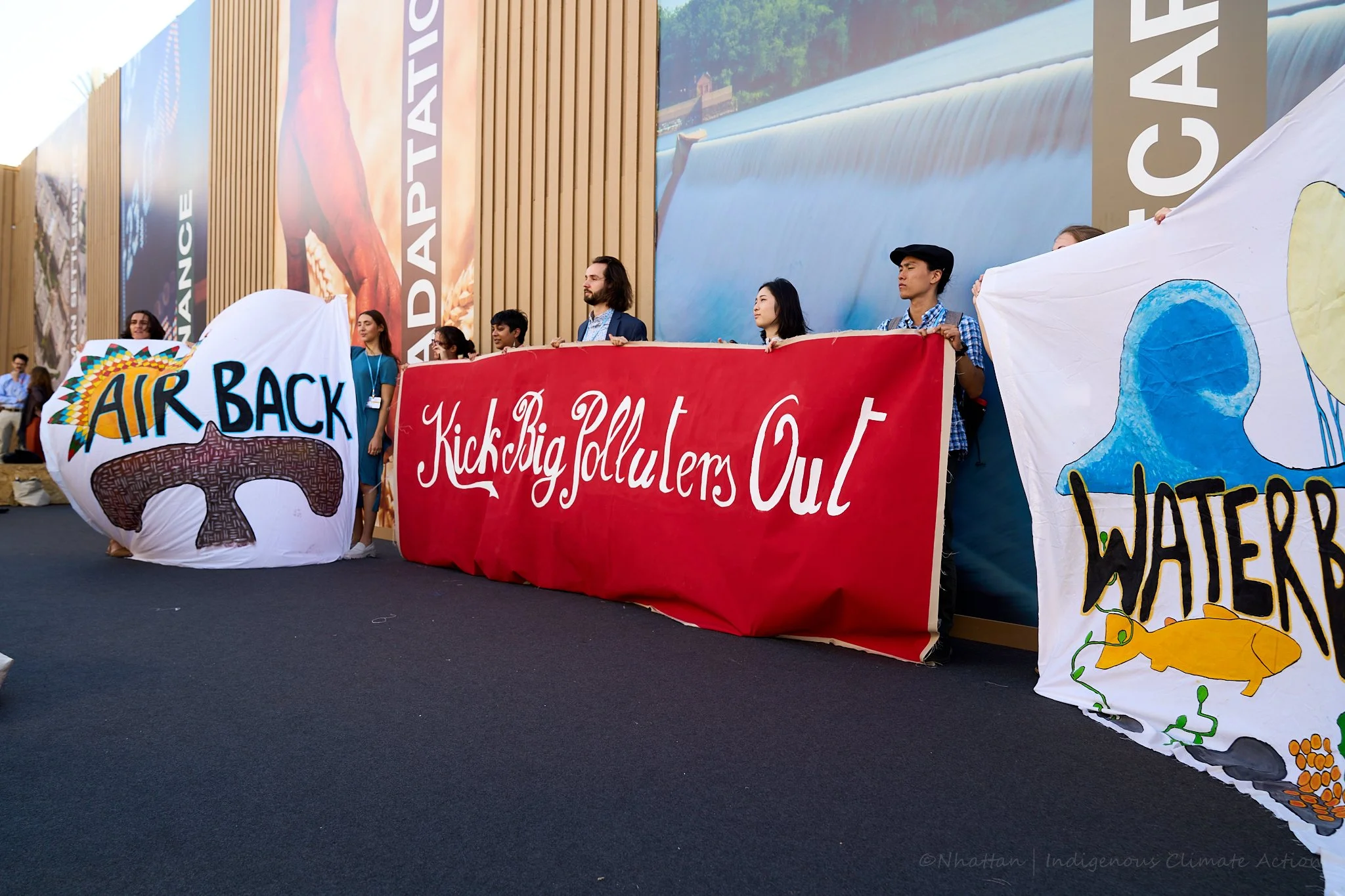COP27: Loss & Damage to Indigenous Rights
This past week, less than a month after the closing of COP27, colonial governments are once again converging to meet for the UN Convention on Biological Diversity (CBD), Conference of the Parties (COP)15 to negotiate the protection and preservation of global biodiversity for planetary health. The connections between this UN gathering and the conclusions of the UN Forum Convention on Climate Change (UNFCCC), COP27 are not to be underestimated. Both UN spaces are grappling with the inclusion of language and processes that acknowledge human and Indigenous rights while at the same time fighting to ensure the economy stays at the core of all decision making. Again and again, we see these colonial spaces choose industry and profit over people and planet.
Loss of Language
It’s been just over three weeks since ICA, alongside hundreds of other Indigenous delegations, returned home from the UNFCCC COP27 in Sharm el Sheikh, Egypt. This year Indigenous peoples continued to be the second largest civil society delegation, second only to oil and gas lobbyists. One alarming fact from this year's COP was that oil and gas participation has increased 25% from the year prior. You could see this in the state pavilions, private pavilions and the climate trade show that played a heavy narrative game of trying to greenwash and rebrand the very culprits of the climate crisis as necessary players in saving the planet.
Instead of moving away from systems of colonialism - systems like predatory capitalism - we are locking ourselves in and holding these systems at the core of so-called climate solutions. This is counter to what we need - new systems and values to drive real solutions to the climate crisis.
Eriel was the last of the ICA delegation to return home from COP27. While the official conference was scheduled to close the day before her flight, negotiations wore on past her departure.
“I left on an early morning flight after a sleepless night awaiting for the final outcomes of the COP as it went into double overtime. I waited for the updates in the boarding area and felt overwhelming sadness about outcomes with each update. I am still trying to process and articulate my thoughts and feelings as I saw decades of work… personal and witnessed… of Indigenous peoples falling to the wayside.”
For decades, Indigenous and civil society groups have been working to advance language within the UNFCCC negotiations that include human and Indigenous rights and we saw success as these demands made their way into the final Paris Agreement (with 6 unique references to Indigenous Peoples Rights). More importantly, we were working to ensure the climate crisis wasn’t solely being addressed from an economic perspective and included room for Indigenous perspectives and solutions. Since this time however, the implementation and operationalization negotiations of the Paris Agreement have degraded this progress. Instead of safeguards for human and Indigenous rights, there are concessions for corporations, oil and gas, military and some of the biggest polluters to continue business as usual in order to save the economy ahead of the race to save the planet.
What’s the Damage?
When it comes to outcomes of COP27, adversarial states clawed back decades of work achieved by Indigenous peoples and civil society. In fact, the negotiations created a pathway to allow continued harms to human, Indigenous and environmental rights. Furthermore, the IPCC called for an end to oil & gas expansion and other economic drivers of the climate crisis. The report also named colonialism as a driver of the crisis and a need to further protect remaining biodiversity in order to save the planet. However, instead of upholding these recommendations, COP27 outcomes created loopholes and strategies to keep us busy and locked into the colonial, capitalist system that put people and ecosystems at greater risk.
To add insult to injury, instead of action on climate we now have a bunch of empty promises of technologies and solutions that “might work in future” and big dollar amounts to remedy the problem via the new climate finance mechanisms agreed upon and applauded by many.
At this point there are numerous articles and essays that highlight the outcomes and failing of this gathering including:
IIPFCC: The position of Indigenous Peoples in relation to the Cover Decision of COP27
Amazon Watch: Reflections on Human Rights and Hope from COP27
One of the most poignant statements we overheard at COP27 was during the International Indigenous Peoples Forum on Climate Change (IIPFCC) press conference when a delegate stated, “Who are we saving the planet for?” in response to the state of negotiations in week one.
Money Won’t Save Us
Many groups have applauded the development of a Loss & Damage fund as a victory. While it is clear that there have been nations that have contributed a great deal to the climate crisis with large emissions profiles and major human rights abuses, compensation is clearly needed. However, if we continue to side step some of the broader systemic issues and root causes of the climate crisis, then we are doing nothing more than distracting and creating spectacle.
Loss & Damage funding, while needed at this time, is still relying on money to address harms rather than removing the harms themselves. Furthermore, it’s not about stopping the harmful activities but rather creating a new line item in the budgets of billionaire corporations or nation states to buy our consent.
While communities across the world are owed reparations by colonial nations and the extractive industries they uphold, we don’t want to slow down the fight for real solutions that will protect us from further loss and damage. Monetary compensation is a deflection and distraction from the ongoing violence against the land and our rights, and is just another tactic in the colonial expansion plan.
A Look Forward
Our thoughts are with the millions of communities that will continue to be the sacrifice zones for billionaire corporations that only care about their bottom line and shareholder interests. We deserve to be more than just a line item in their budgets, after all we have been responsible for safeguarding 80% of the world's biodiversity. We should be driving solutions that serve our communities and our relatives. The answers are about restoring these relationships and learning to listen to a language that has been forgotten by so many, a language of the land.
While there is a clear need for continued participation of Indigenous peoples in these UN spaces, the work of ICA and so many others remains within our communities, our relations, and ourselves. We need a global shift from centering the economy within these discussions to centering and protecting the voices of those already protecting our lands, water, and the world’s biodiversity.
At COP28 we need to kick polluters, oil and gas, and other dirty corporations out. We need to stop the expansion and ensure we bring back the protection of human, Indigenous and environmental rights.
Eriel adds, “I am sitting out the COP15 CBD negotiations this month, where I have heard they are planning on trying to create the ‘Paris Agreement’ on Biodiversity where the negotiations are already degrading into a debate about who pays for this. The conversation we need to be tabling is how to reconcile with the end of capitalism for the world to survive instead of getting bogged down in how capitalism can survive the end of the world.”





